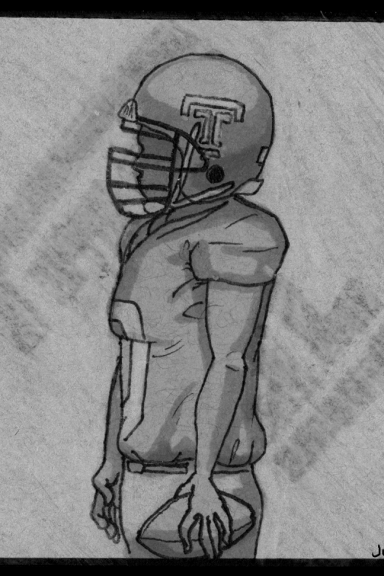

In the words of G.O.B. Bluth, many people may feel that Temple has “made a huge mistake.”
Praise Martin-Oguike, a former Temple student and football player, was suspended from the team due to allegations of rape in May 2012. Martin-Oguike was subsequently suspended from the university entirely.
On Oct. 7, Martin-Oguike went to trial. An examination of cellphone records suggested the victim in question had ulterior motives and accused Martin-Oguike of rape when he did not give her what she wanted. Martin-Oguike’s lawyer, James Funt, said she desired a romantic relationship.
If Funt’s assertions are true, what happened to Martin-Oguike can only be considered an injustice.
But it’s also extremely rare.
While I hope Martin-Oguike’s situation is resolved correctly, his case has me worried for other reasons.
A Temple student who wished to remain anonymous said the case is an example of “the culture of how accused sex offenders are guilty until proven innocent,” a common reaction to Martin-Oguike’s circumstances. But I disagree.
While high-profile rape cases such as the Duke lacrosse team and the Anita Brown case tend to favor the victim, and sometimes wrongly so, this is hardly the norm among cases with lower notoriety.
It’s easy to see Martin-Oguike’s outcome as the “culture,” because the real culture is silence. According to statistics compiled by the Rape, Abuse and Incest National Network, only 46 percent of rapes are reported to the police. Just 12 percent lead to an arrest, 9 percent are prosecuted, 5 percent lead to a felony and a mere 3 percent of accused offenders spend even a day in jail.
There have been four reported cases of sexual assault on campus in October alone, bringing this semester’s total to nine reported sex crimes. According to Temple’s 2013 Annual Crime and Safety Report, only one sex crime was reported on Main Campus in the entire 2012 calendar year. It is unfortunate that only high-profile case this semester casts the accuser in a negative light.
According to the rape survival and coping website Project Unbreakable, females in our society are still told things like, “Maybe you shouldn’t drink so much,” and “You shouldn’t have been out.” It’s no surprise that there is still fear when it comes to reporting a rape to authorities. It becomes increasingly difficult for male victims to speak up as well, when they face allegations such as, “How can a girl rape a boy?” and “Men can’t get raped.”
The culture doesn’t unfairly persecute the accused; it unfairly shames victims into silence. This is especially dangerous on a college campus, because according to statistics compiled by RAINN, 80 percent of rapes occur when the victim is under age 30.
Regardless of how Martin-Oguike’s situation pans out, Temple must remain vigilant in providing a safe atmosphere for student victims of assault to come forward.
This is made possible in part by programs such as Temple’s Wellness Resource Center, which offers consultations with students and provides resources and steps to move forward after sexual assault. Temple also has free counseling for students through Tuttleman Counseling Services. But it can’t stop there.
Providing a safe atmosphere for victims and stopping assault falls, in part, on the shoulders of other Temple students. A simple way to achieve this is to listen to peers who have been assaulted without doubting or questioning them, and make sure your friends get home safely from parties.
Some students are taking matters into their own hands on a larger scale. Former Temple student Fawn Kissel has tentative plans to start a volunteer-based, student-run bike escort program. The program would involve scanning the campus on weekends, providing water and helping people find their way home safely.
“The way we as a society head this off is by education and prevention, by looking out for each other,” Kissel said.
For now, students can call Temple Police if they feel wary walking home. But Kissel’s idea could be a more direct way to prevent crime, and it is an example of students taking initiative.
Martin-Oguike’s case should be used as an opportunity to critically look at Temple’s student conduct hearing system, not as a way for the public to further silence assault victims. Fortunately, students are already making an effort to stop that from happening.
Grace Holleran can be reached at grace.elizabeth.holleran@temple.edu or on Twitter @coupsdegrace.
CORRECTION: A version of this article that appeared in print incorrectly stated that Martin-Oguike was expelled after a Student Code of Conduct hearing. Martin-Oguike was suspended from the university without participating in the Student Code of Conduct hearing process.



Be the first to comment